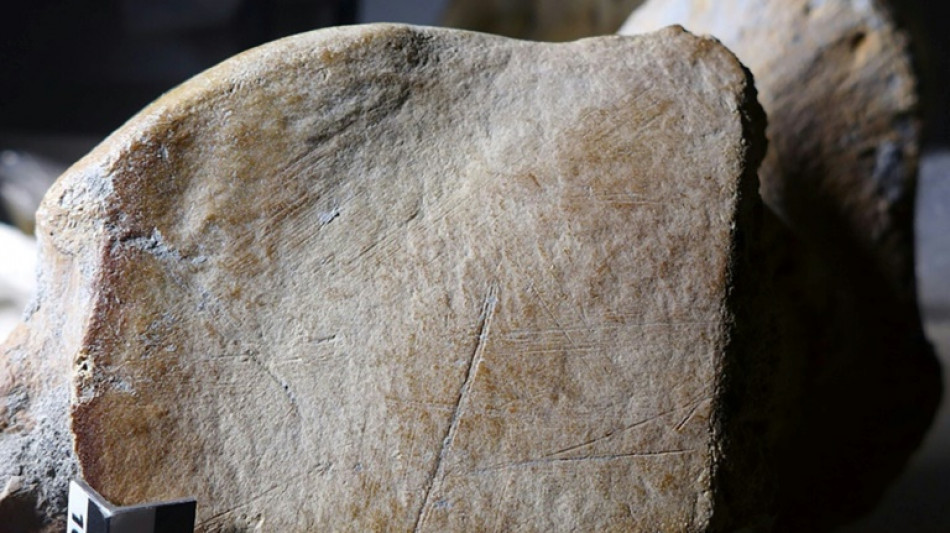
-
 Iran, US prepare for Oman talks after deadly protest crackdown
Iran, US prepare for Oman talks after deadly protest crackdown
-
Winter Olympics opening ceremony nears as virus disrupts ice hockey

-
 Mining giant Rio Tinto abandons Glencore merger bid
Mining giant Rio Tinto abandons Glencore merger bid
-
Davos forum opens probe into CEO Brende's Epstein links

-
 ECB warns of stronger euro impact, holds rates
ECB warns of stronger euro impact, holds rates
-
Famine spreading in Sudan's Darfur, warn UN-backed experts

-
 Lights back on in eastern Cuba after widespread blackout
Lights back on in eastern Cuba after widespread blackout
-
Russia, US agree to resume military contacts at Ukraine talks

-
 Greece aims to cut queues at ancient sites with new portal
Greece aims to cut queues at ancient sites with new portal
-
No time frame to get Palmer in 'perfect' shape - Rosenior

-
 Stocks fall as tech valuation fears stoke volatility
Stocks fall as tech valuation fears stoke volatility
-
US Olympic body backs LA28 leadership amid Wasserman scandal

-
 Gnabry extends Bayern Munich deal until 2028
Gnabry extends Bayern Munich deal until 2028
-
England captain Stokes suffers facial injury after being hit by ball

-
 Italy captain Lamaro amongst trio set for 50th caps against Scotland
Italy captain Lamaro amongst trio set for 50th caps against Scotland
-
Piastri plays down McLaren rivalry with champion Norris

-
 ECB holds interest rates as strong euro causes jitters
ECB holds interest rates as strong euro causes jitters
-
Spain, Portugal face floods and chaos after deadly new storm

-
 EU close to sealing trade deal with Australia
EU close to sealing trade deal with Australia
-
German Cup final to stay in Berlin until 2030

-
 What does Iran want from talks with the US?
What does Iran want from talks with the US?
-
Taming the lion: Olympians take on Bormio's terrifying Stelvio piste

-
 Wind turbine maker Vestas sees record revenue in 2025
Wind turbine maker Vestas sees record revenue in 2025
-
Italy's Casse tops second Olympic downhill training

-
 Anti-doping boss 'uncomfortable' with Valieva's coach at Olympics
Anti-doping boss 'uncomfortable' with Valieva's coach at Olympics
-
Bitcoin under $70,000 for first time since Trump's election

-
 'I am sorry,' embattled UK PM tells Epstein victims
'I am sorry,' embattled UK PM tells Epstein victims
-
England's Brook predicts record 300-plus scores at T20 World Cup

-
 Ukraine, Russia swap prisoners, US says 'work remains' to end war
Ukraine, Russia swap prisoners, US says 'work remains' to end war
-
Wales' Rees-Zammit at full-back for Six Nations return against England

-
 Sad horses and Draco Malfoy: China's unexpected Lunar New Year trends
Sad horses and Draco Malfoy: China's unexpected Lunar New Year trends
-
Hong Kong students dissolve pro-democracy group under 'severe' pressure

-
 Germany claws back 59 mn euros from Amazon over price controls
Germany claws back 59 mn euros from Amazon over price controls
-
Germany claws back 70 mn euros from Amazon over price controls

-
 VW and Stellantis urge help to keep carmaking in Europe
VW and Stellantis urge help to keep carmaking in Europe
-
Stock markets drop amid tech concerns before rate calls

-
 BBVA posts record profit after failed Sabadell takeover
BBVA posts record profit after failed Sabadell takeover
-
UN human rights agency in 'survival mode': chief

-
 Greenpeace slams fossil fuel sponsors for Winter Olympics
Greenpeace slams fossil fuel sponsors for Winter Olympics
-
Greenpeace slams fossel fuel sponsors for Winter Olympics

-
 Kinghorn, Van der Merwe dropped by Scotland for Six Nations opener
Kinghorn, Van der Merwe dropped by Scotland for Six Nations opener
-
Russia says thwarted smuggling of giant meteorite to UK

-
 Salt war heats up in ice-glazed Berlin
Salt war heats up in ice-glazed Berlin
-
Liverpool in 'good place' for years to come, says Slot

-
 Heathrow still Europe's busiest airport, but Istanbul gaining fast
Heathrow still Europe's busiest airport, but Istanbul gaining fast
-
Highest storm alert lifted in Spain, one woman missing

-
 Shell profits climb despite falling oil prices
Shell profits climb despite falling oil prices
-
Pakistan will seek govt nod in potential India T20 finals clash

-
 China shuns calls to enter nuclear talks after US-Russia treaty lapses
China shuns calls to enter nuclear talks after US-Russia treaty lapses
-
German factory orders rise at fastest rate in 2 years in December

| SCS | 0.12% | 16.14 | $ | |
| BP | -2.93% | 38.085 | $ | |
| NGG | -1.02% | 86.905 | $ | |
| CMSD | 0.17% | 23.91 | $ | |
| BTI | 0.08% | 61.68 | $ | |
| RIO | -4.49% | 92.33 | $ | |
| RBGPF | 0.12% | 82.5 | $ | |
| GSK | 3.34% | 59.21 | $ | |
| RYCEF | -0.36% | 16.62 | $ | |
| AZN | 1.06% | 189.46 | $ | |
| CMSC | -0.15% | 23.485 | $ | |
| BCE | -2.85% | 25.61 | $ | |
| BCC | -0.92% | 89.41 | $ | |
| JRI | 1.46% | 13.345 | $ | |
| VOD | -6.47% | 14.755 | $ | |
| RELX | 2.36% | 30.5 | $ |

Neanderthals hunted, butchered massive elephants: study
Neanderthals may have lived in larger groups than previously believed, hunting massive elephants that were up to three times bigger than those of today, according to a new study.
The researchers reached their conclusions, published in the journal Science Advances on Wednesday, based on examinations of the 125,000-year-old skeletal remains of straight-tusked elephants found near Halle in central Germany.
The bones of around 70 elephants from the Pleistocene era were discovered in the 1980s in a huge coal quarry that has since been converted into an artificial lake.
Elephants of the time were much larger than the woolly mammoth and three times the size of the present day Asian elephant, and an adult male could weigh up to 13 metric tons.
"Hunting these giant animals and completely butchering them was part of Neanderthal subsistence activities at this location," Wil Roebroeks, a co-author of the study, told AFP.
"This constitutes the first clear-cut evidence of elephant hunting in human evolution," said Roebroeks, a professor of archeology at Leiden University in the Netherlands.
The study suggests that the Neanderthals who lived in the area for 2,000 to 4,000 years were less mobile and formed social units "substantially larger than commonly envisaged."
"Neanderthals were not simple slaves of nature, original hippies living off the land," Roebroeks said.
"They were actually shaping their environment, by fire... and also by having a big impact on the biggest animals that were around in the world at that time."
- 'Calorie bombs' -
The researchers determined the elephants had been hunted -- and not just scavenged -- because of the age and sex profile of the remains found in the quarry.
Most of them were males and there were few young or old ones.
"It's a typical selection made by hunters who went for the biggest prey," Roebroeks said.
Adult male elephants would have been easier to hunt than females, who tend to move in herds protecting their young.
"Whereas adult males are solitary animals most of the time," Roebroeks said. "So they are easier to immobilize, driving them into mud and pit traps.
"And they are the biggest calorie bombs that are walking around in these landscapes."
The researchers said the Neanderthals were able to preserve the huge quantities of food provided by a single elephant and it would sustain them for months.
"An average male elephant of about 10 tons would have yielded something like, minimally, 2,500 daily portions for an adult Neanderthal," Roebroeks said.
"They could deal with it, either by preserving it for longer time periods -- that is already something that we didn't know -- or simply by the fact that they lived in much, much larger groups than we commonly infer."
- Cut marks -
The researchers said the Neanderthals used flint tools to butcher the animals which left clear traces on the well preserved bones.
"They are classical cut marks that are generated by cutting and scraping off the meat from the bones," Roebroeks said.
Traces of charcoal fires used by the Neanderthals were also found, suggesting they may have dried meat by hanging it on racks and building a fire underneath.
Roebroeks said that while the study provides evidence the Neanderthals lived in large social units it is difficult to estimate exactly how large those groups actually were.
"But if you have a 10-ton elephant and you want to process that animal before it becomes rotten you need something like 20 people to finish it in a week," he said.
M.Qasim--SF-PST




